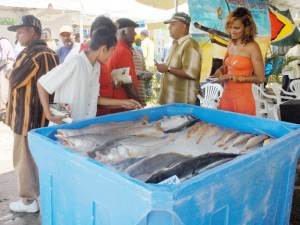Minister of Agriculture Robert Persaud says tackling challenges in the fishing industry is “a constant battle that we must not let off,” and he encouraged fishermen to take full advantage of the prospects aquaculture offers, especially in the light of the threats the country faces from climate change.

Persaud also addressed issues such as the rising cost of inputs and listed the challenges of implementing an institutional framework to manage the fishing industry.
Coast Guard Commander Trevor Blenman also discussed piracy, citing recent attacks on two separate fishing boats in the Corentyne. He acknowledged that piracy continues to be a plague to fisher folk and echoed the minister’s urging that in order to reduce piracy fishermen must cooperate with the authorities to institute plans.

Meanwhile, in keeping with this year’s theme for Fishermen’s Day ‘Fisheries and the Challenges of Climate Change: Being prepared’, Chairman of the National Climate Committee of Guyana Shyam Nokta said more attention must be paid to the serious implications for the marine and inland fishing industry. He said Guyana is vulnerable as inland fishing may be affected by salt water intrusion due to flooding from sea defence breaches and the fact the sea levels are predicted to rise some 11 to 17 inches.
Nokta said data trends are indicating a change in foraging and migrational patterns, which is of consequence to marine fishing. He said if Guyana hopes to effectively combat climate changes and its effects on the fishing industry then it is critical to develop ‘comprehensive monitoring programmes’; trawler owners should limit fleet size and a “closed season should be enforced.” Extra efforts need to be allocated to sea defence drainage and irrigation and use of land for aquaculture, he added. Nokta pointed out that Guyana’s challenge lies in the lack of “sound baseline data” and scientific information.
Chairman of the National Aquaculture Associa-tion of Guyana (NAAG) Dr Leslie Chin told the gathering that in the light of the current food crisis, aquaculture is a very lucrative venture. He said one acre of fish pond can bring in a gross profit of $1 million per year and that by 2016 aquaculture will be a major contributor to Guyana’s economy. Chin said Guyana is currently exporting about 6,000 lbs to 7,000 lbs of fish reared using this alternative fishing method and within the next six months about 10,000 lbs will be exported.
Chin advised fishermen to explore this option; noting that the only challenge is the availability of land which can be addressed by the agriculture and housing ministries.
In closing Persaud told the group that tremendous prospects abound in the aquaculture field and that fishermen should seek ways of tapping into these opportunities.






